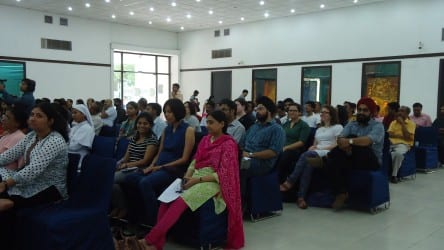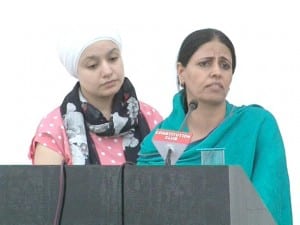NEW DELHI—The demand to abolosh the death penalty in India today got a boost when a conference was organized at Constitution Club, New Delhi, where renowned speakers from the legal academic and NGO fraternity strongly came out with the demand that the death penalty should be abolished from Statue books with immediate effect. The ‘Campaign Against the Death Penalty’ comprising of distinguished jurists, senior lawyers, human rights groups, academics, NGOs and activists have strongly asserted the demand in wake of the disappointing return to capital punishment in the country. The secretive and barbaric nature of these executions has added to the alarm and concern among the activists.
Speaking on the occasion Justice A.K Ganguly, Retired Supreme Court Judge, said the fact that Supreme Court in 2009 itself accepted that they have erred in hanging six persons by not following the ratio of the Bachan Singh judgment is a powerful reminder for abolition. The argument that the death penalty amounts to punishment is erroneous since it ends the possibility a person reforming, which is intrinsic to the very concept of punishment. The handing of the death penalty has become dangerous because of its arbitrary and judge centric nature and he strongly demanded its abolition.
“Death is not a punishment it is killing…something that is irreversible cannot be a punishment. Death sentence is a full stop not a coma. ”
On the case of Professor Bhullar, Justice Ganguly stated “The split verdict was granted in case of Bhullar- If two judges say he is guilty and one says he is not, then give him life imprisonment but the death sentence in his case is atrocious, unethical, and barbaric.”
Anup Surendranath, Professor of law at the National Law University Delhi, analysed the inconsistent approach to alleged terror cases and other “heinous crimes” applied by the Supreme Court in awarding the death penalty pointed out that even Israel, a country which is known for its harsh and uncompromising approach to terrorism understands that the death sentence does not deter terrorism.
Journalist Iftikar Gilani, discussed the situation in Kashmir and drew our attention to two contrasting outcomes where individuals had and had not been executed. In the first situation, the hanging led to further unrest and the deaths of thousands. In the latter, the person who was finally released was responsible for the negotiation of a peace accord, saving the lives of thousands.
Dr. V Suresh, General Secretary, People’s Union for Civil Liberties (PUCL) emphasized the decision to execute is to a great extent decided by political considerations and the Supreme Court in Professor Bhullar’s case has increased the possibility of its misuse by creating a new category of ‘terrorist’ while considering the mercy petition. He adds that the ethnic and social status bias is quite evident in death penalty sentencing: Dalits, minorities and the poor are overwhelmingly more likely to go to the gallows.
A statement to the conference by Justice MB Shah (who found that Professor Bhullar should be acquitted), was read by Satnam Singh Bains, Barrister from the UK.
Reiterated MB Shah’s concerns over the Bhullar case:
“A Confessional statement made before a police (under TADA) would not be sufficient for imposing death sentence because there would be always a room for doubt…. In any set of circumstance, this was a very good case for allowing mercy petition, without being inference by any extraneous reasons…. If such confessional statements are relied for imposing death sentence, number of innocent persons would stand convicted.”
Satnam highlighted the role of some sections of the media who irresponsibly reporting alleged terrorist offences (as in Bhullar’s case) creating a hostile public atmosphere towards those on death row. He pointed out that Professor Bhullar has never been convicted for being a member of a proscribed organisation, or for any other offences relating to a terrorist group. Satnam also analysed the inherent flaws in Bhullar’s conviction.
Shailesh Rai of Amnesty International discussed the “lethal lottery” of the death penalty by analysing a number of judgments. He highlighted the inconsistent and arbitrary manner in which the Supreme Court, in similar kinds of cases, makes its judgements – not so much by legal consideration but by the whim of the judge(s) hearing the case
Kavita Krishnan, AIPWA, discussed how after the December 16 rape case the media deliberately tried to reduce the debate to the single demand of hanging the rapist. The women’s movement, to a great extent succeeded in exposing the mask of the patriarchal forces that were hiding their real bias against women’s freedom behind the demand of ‘Hang the Rapist’. It is very significant that the progressive women’s movements are against the death penalty for rape, holding that the death penalty is not part of the solution to a much deeper rooted problem.
Reprieve’s Meagan Lee (from the United Kingdom) , Stated that Professor Bhullar’s case is an exceptional one. The Indian Supreme Court’s recent affirmation of the death sentence in his case is inconsistent with the international standards that have been developed in relation to “death-row” phenomenon. She stated that such prolonged delays can constitute cruel, inhuman and degrading treatment amounting to torture. There’s been a continued global decline in application of he death penalty, with only 21 countries in the world known to have carried out executions in 2012. India has also voted against UN General Assembly resolutions calling for a moratorium on the death penalty.”
Navneet Kaur Bhullar, wife of Professor Bhullar, told of her moving 18 year fight for Justice and the journey of pain and agony that she has gone through to seek justice for Professor Bhullar. Since the 2002 Supreme Court verdict she has lobbied the Indian, German, and United Kingdom Governments as well as the European Union. She thanked all the delegates, those in India and abroad who had taken up the case of Professor Bhullar.
Razia Ismail Abazzi from the India Alliance for Child Rights, spoke on the issue of juvenile justice. She pertinently stated that the issue is not whether someone who is a few months above the age of 18 can be executed and someone a few months the other way cannot be executed, but simply that there should not be the death penalty for anyone of any age.
Henry Tipghane from People’s Watch spoke on the death sentences passed on the alleged associates of Veerappan now aged in their 60s. As with many death row cases there had been an inordinate delay. Henry highlighted the gross human rights violations committed by the Special Task force, purportedly established to catch Veerappan, which included torture, custodial deaths, and rape, has gone unpunished. He highlighted the contradiction between the failure of the Indian state to secure justice for the victims before the NHRC and members of the security forces involved in human rights violation being accelerated for promotion.
Colin Gonsalves Senior Advocate of the Human Rights Law Network (HRLN) moderated the sessions and emphasized that this is not the first and nor the last effort to abolish the death penalty. It should go on till we succeed in removing these draconian provisions from statue books.
The speakers who spoke on the occasion were Colin Gonsalves, Senior Advocate, Director of Human Rights Law Network , Justice A.K. Ganguly (Retd.) Supreme Court of India, Razia Iamail Abbazi, Indian Alliance for Child Rights, Iftikar Gillani, Journalist, Henri Tipghane, People’s watch, Shailesh Rai, Amnesty International, Professor Anup Surendranath, NLU Delhi, Meagan Lea, Reprieve, Gurvinder Singh Sidhu, Secretary Lawyers for Justice, Satnam Singh Bains, UK Barrister, Kavita Krishnan, All India Progressive Women Association, Suhas Chakma, Asian Centre for Human Rights, Navneet Kaur Bhullar, wife of Professor Bhullar, Jaswant Kaur, Human Rights Advocate, and Smriti Minocha of HRLN, .
Around 200 people participated in the conference which was organised by Human Rights Law Network in collaboration with Peoples Union for Civil Liberties, Amnesty International, Human Rights Watch, Free Bhullar Campaign, PVCHR, AISA, Anhad, Jamia Teachers’ Solidarity Association, , Indian Alliance for Child Rights, Lawyers for Human Rights International, Lawyers for Justice, People’s Watch, SHRG and other NGOs.
The full conference will be available on YouTube under the heading “Campaign against the Death Penalty India Conference 10/5/2013”






